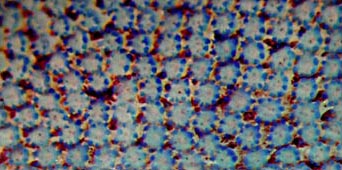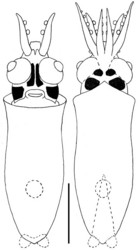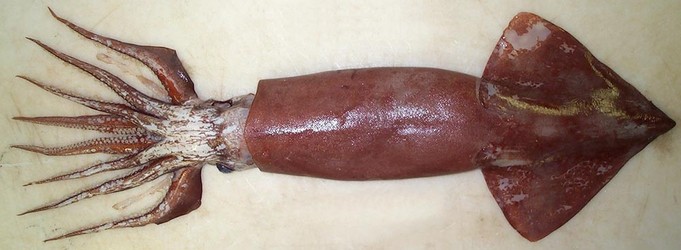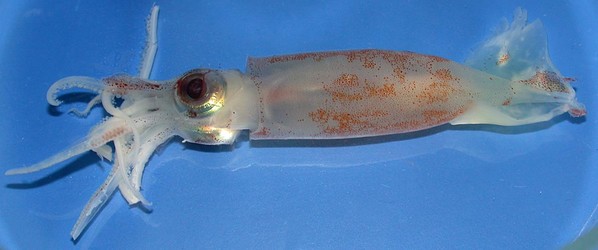Pholidoteuthis massyae
Michael Vecchione and Richard E. YoungIntroduction
This is a large, fairly muscular squid, reaching 58 cm ML that occurs world-wide but little is known of its biology or ecology.
Diagnosis
A Pholidoteuthis ...
- with papillate tubercules.
Characteristics
- Arms
- Longest 30-60% of ML.
- Longest 30-60% of ML.
- Head
- Beaks: Descriptions can be found here: Lower beak; upper beak.
- Beaks: Descriptions can be found here: Lower beak; upper beak.
- Mantle
- Mantle with papillate tubercules.
 Click on an image to view larger version & data in a new window
Click on an image to view larger version & data in a new window
Figure. Ventral view of a portion of the mantle of P. massyae Papillae on the tubercules are stained lightly with methylene blue stain. Photograph by R. Young.
Scanning electron micrographs of the papillate tubercules can be seen here.
- Mantle with papillate tubercules.
- Gladius
- With primary (?) conus.
- With primary (?) conus.
- Fins
- Length 35-45% of ML.
Comments
Arm suckers have 10-15 sharp teeth on the distal half of the inner ring.
Nomenclature
Pfeffer erected the genus Tetronychoteuthis in 1900 based on a specimen he incorrectly thought to be Onychoteuthis dussumieri Orbigny, 1839 but was actually a specimen of Tetronychoteuthis massyae, a species he described in 1912. Onychoteuthis dussumieri Orbigny, 1839, however, is a species of Onykia (formerly Moroteuthis) (Onychoteuthididae) (Roper and Lu, 1989; Nesis and Nikitina, 1990). Pholidoteuthis was erected by Adam (1950) for a new species Pholidoteuthis boschmai without realizing his species was the same as the damaged specimen Pfeffer (1900) had made the type of Tetronychoteuthis. Nesis and Nikitina (1990) demonstrated that Adam's species and that described by Pfeffer as Tetronychoteuthis massyae belong in the same genus. They considered Tetronychoteuthis to be a nomina dubia, leaving Pholidoteuthis as the valid generic name. Pfeffer (1912) believed that the specimen he used to establish Tetronychoteuthis could represent an older stage of Tetronychoteuthis massyae. Nesis and Nikitina (1990), also, considered this a possibility. The primary character separating the two forms besides size is the shape and structure of the tubercules. These, however, change with ontogeny (Nesis and Nikitina, 1990). Recently O'Shea, et al. (2007), after examining additional specimens, placed P. boschmai as the junior synonym of P. massyae.
Life History
The paralarva of P. massyae has been tentatively recognized from waters off Hawaii via a process of elimination rather than by the more reliable method of tracing a size series to an identifiable juvenile. One of the characteristic features is the posterior position of the digestive gland (dotted circle) which is found in families with buccal connectives that attach to the ventral borders of arms IV. In this species the digestive gland is unusually far posterior. The scale bar is 1 mm.




Figure. Dorsal and ventral views of paralarvae of P. massyae from Hawaiian waters. Far left (thumbnail) - Figure shows relative sizes of the two paralarval stages. Left - 2.7 mm ML. Right - 8.2 mm ML. Chromatophore patterns reconstructed from damaged specimens and may be incomplete. Drawings by R. Young.
Distribution
Type locality is the North Atlantic at at 48°N, 16°W. Distribution is circumglobal in subtropical to cold temperate waters (Nesis, 1982) but specimens from different oceans have not been directly compared.
References
Adam, W. 1950. Un cephalopode nouveau: Pholidoteuthis boschmai gen. Et sp. Nov. Koninklijke Nederlandse Akademie van Wetenschappen, 53: 1-8.
Clarke, M. R. 1980. Cephalopoda in the diet of sperm whales of the Southern Hemisphere and their bearing on sperm whale biology. Discovery Reports, 37: 1-324.
Nesis, K.N. and I.V. Nikitina. 1990. Revision of the squid family Lepidoteuthidae. Zool. Zhurnal, 69: 39-49.
Pfeffer, G. 1912. Die Cephalopoden der Plankton-Expedition. Ergebniss der Plankton-Expedition der Humboldt-Stiftung. 2: 1-815.
Roper, C.F.E. and C.C. Lu. 1989. Systematic status of Lepidoteuthis, Pholidoteuthis and Tetronychoteuthis (Cephalopoda: Oegopsida). Proc. Biol. Soc. Wash., 102: 805-807.
Title Illustrations

| Scientific Name |
Pholidoteuthis Pholidoteuthis massyae |
|---|---|
| Location | Sub-Antarctic waters near New Zealand at 50?01'S, 168?46'E |
| Specimen Condition | Live Specimen |
| Identified By | Darren Stevens |
| View | Dorsal |
| Size | 411 mm ML |
| Image Use |
 This media file is licensed under the Creative Commons Attribution License - Version 3.0. This media file is licensed under the Creative Commons Attribution License - Version 3.0.
|
| Copyright | © |
About This Page

National Museum of Natural History, Washington, D. C. , USA
Richard E. Young

University of Hawaii, Honolulu, HI, USA
Page copyright © 1999 and Richard E. Young
 Page: Tree of Life
Pholidoteuthis massyae .
Authored by
Michael Vecchione and Richard E. Young.
The TEXT of this page is licensed under the
Creative Commons Attribution-NonCommercial License - Version 3.0. Note that images and other media
featured on this page are each governed by their own license, and they may or may not be available
for reuse. Click on an image or a media link to access the media data window, which provides the
relevant licensing information. For the general terms and conditions of ToL material reuse and
redistribution, please see the Tree of Life Copyright
Policies.
Page: Tree of Life
Pholidoteuthis massyae .
Authored by
Michael Vecchione and Richard E. Young.
The TEXT of this page is licensed under the
Creative Commons Attribution-NonCommercial License - Version 3.0. Note that images and other media
featured on this page are each governed by their own license, and they may or may not be available
for reuse. Click on an image or a media link to access the media data window, which provides the
relevant licensing information. For the general terms and conditions of ToL material reuse and
redistribution, please see the Tree of Life Copyright
Policies.
- Content changed 20 March 2011
Citing this page:
Vecchione, Michael and Richard E. Young. 2011. Pholidoteuthis massyae . Version 20 March 2011 (under construction). http://tolweb.org/Pholidoteuthis_massyae/19854/2011.03.20 in The Tree of Life Web Project, http://tolweb.org/









 Go to quick links
Go to quick search
Go to navigation for this section of the ToL site
Go to detailed links for the ToL site
Go to quick links
Go to quick search
Go to navigation for this section of the ToL site
Go to detailed links for the ToL site